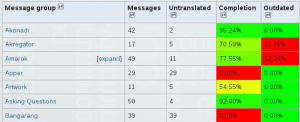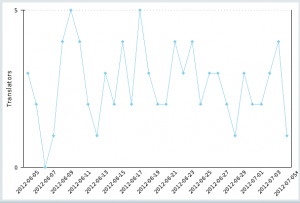There is a strange sort of time-warp. We can’t remember which day it is, yet the week is disappearing fast. Most of the time I’ve been working with a group on UserBase issues. Matthias (Pipesmoker) Meßmer has been on-call to fix many theming or display issues that we identified, while Niklas (Nikerabbit) Laxström, our wonderful Translate extension author, has added new features for our delight.
In the past, we used “Special:myLanguage” markup to help “other-language-speakers” to get the correct language page, but when you were working on a page, adding a link with that markup did not show the essential red-link that warns you that the page is not yet created. Now it does show a red-link, which makes life so much easier for all contributors.
Another “big deal” for us was that there were times when it was decided that a page had been poorly named, or wrongly inserted into the page structure. Because some of our translators are so diligent, we acquired translations of the page almost immediately, and before the problem was realised. Once a page had translations added it was not possible to move it. Now, thanks to yet another of Niklas’ efforts, a page together with all its translations can be moved to a new location.
You may remember that Claus Christensen is our Danish translator for UserBase. He and I have worked mainly on improving accessibility. Over the lifetime of UserBase we have added a great deal of help for users and contributors, yet people have found it difficult to find the exact function they needed. We decided that extra sidebar links were necessary. Again, Matthias and Niklas had to help the more arcane needs, but finding your way around should be very much easier.
Previously we have thought that it is not necessary to translate help pages, on the grounds that in order to translate you have to have a good grasp of English. Recently, though, Zhao Han pointed out to me that for people who use other-script languages it can be helpful to see translations of help pages, so we worked on that too.
Lots of small changes have happened too, mostly the sort that you don’t notice when they are right, but you would have seen when they were not so good.
Finally, Hans (Mogger) Chen decided that UserBase needed its own strong logo. He designed a possible logo, then took it to Eugene (it-s) Trounev, who assessed the practicalities and started on “the real design”. So – watch out for that before the end of the week.
Oddly enough, even through all the long days of activity, we still have managed to have fun. Eugene’s prowess in the kitchen is now known, and I’m sure he’ll be in much demand in the future too. I’ve never tried handling food on a swinging barbecue before – and probably won’t again! You need more hands than an octopus to hold everything steady. We’ve had wonderful warm, sunny weather, so whenever the head needed clearing we’ve sat outside and discussed things, but we’ve been careful, because the first day some of us were sunburned before we realised what was happening.
I’m so impressed with the amount of work we’ve managed in the time, and will be pushing for a repeat sprint to bring the next set of improvements.



